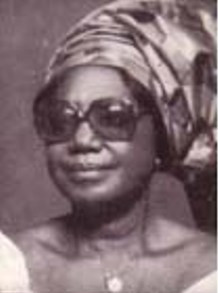Flora Nwapa facts for kids
Quick facts for kids
Flora Nwapa
|
|
|---|---|
 |
|
| Born | 13 January 1931 Oguta, Nigeria |
| Died | 16 October 1993 (aged 62) Enugu, Nigeria |
| Nationality | Nigerian |
| Alma mater | University College, Ibadan; Edinburgh University |
| Genres | Novels; short stories; poems; plays |
| Notable works | Efuru (1966) Idu (1970) This Is Lagos and Other Stories (1971) |
| Spouse | Chief Gogo Nwakuche |
| Children | 3 |
Flora Nwapa (born Florence Nwanzuruahu Nkiru Nwapa; January 13, 1931 – October 16, 1993) was a famous Nigerian author. Many people call her the mother of modern African literature. She was the first African woman writer to have her novel published in English in Britain.
Flora Nwapa became known around the world with her first novel, Efuru, which came out in 1966. She was 30 years old at the time. Even though she didn't call herself a feminist, she was well-known for showing life and traditions from the point of view of an Igbo woman.
Nwapa also did important work for the government after the Biafran War. She helped children who had lost their parents and people who had to leave their homes because of the war. She also published African books and supported women in African society. In 1970, she started her own publishing company called Tana Press in Nigeria. This made her one of the first African women to own a publishing house.
Contents
About Flora Nwapa
Her Early Life and Schooling
Flora Nwapa was born in Oguta, a town in southeastern Nigeria. She was the oldest of six children. Her father, Christopher Ijeoma, worked for a trading company, and her mother, Martha Nwapa, was a drama teacher.
Flora went to school in Oguta, then to secondary schools in Elelenwa and CMS Girls School, Lagos. This school later moved and became St Anne's School Ibadan. In 1953, when she was 22, she started university. She earned her first degree from University College, Ibadan, in 1957. After that, she went to Scotland and got a special teaching diploma from Edinburgh University in 1958.
Her Family
Flora Nwapa had three children: Ejine Nzeribe, Uzoma Gogo Nwakuche, and Amede Nzeribe. She was married to Chief Gogo Nwakuche.
Her uncle, AC Nwapa, was Nigeria's first Minister of Commerce and Industries. This was shown in a documentary about her family called The House of Nwapa.
Working in Education and Government
After finishing her studies, Flora Nwapa returned to Nigeria. She worked as an Education Officer in Calabar until 1959. Then, she became a teacher at Queen's School in Enugu, where she taught English and geography from 1959 to 1962.
She continued to work in both education and public service. She was an Assistant Registrar at the University of Lagos from 1962 to 1967. After the Nigerian civil war (1967–70), she took on important government roles. She was the Minister of Health and Social Welfare in East Central State from 1970 to 1971. Later, she became the Minister of Lands, Survey, and Urban Development from 1971 to 1974.
She also taught at Alvan Ikoku College of Education in Owerri, Nigeria. In 1989, she became a visiting professor of creative writing at the University of Maiduguri.
Her Books and Publishing Company
Flora Nwapa's first book, Efuru, was published in 1966. It was a very important book because it was the first novel in English by an African woman writer. She sent her story to the famous Nigerian author Chinua Achebe in 1962. He loved it and even sent her money to mail the story to the publisher, Heinemann, in England.
She wrote other novels like Idu (1970), Never Again (1975), One is Enough (1981), and Women are Different (1986). She also wrote two collections of short stories: This is Lagos (1971) and Wives at War (1980). She published a book of poems called Cassava Song and Rice Song (1986) and several books for children.
In 1974, she started Tana Press, and in 1977, the Flora Nwapa Company. Through these companies, she published her own books for adults and children, as well as books by other writers. One of her main goals was "to inform and educate women all over the world... about the role of women in Nigeria, their economic independence, their relationship with their husbands and children, their traditional beliefs and their status in the community as a whole." Tana Press was special because it was the first publishing house run by a woman that aimed to reach many female readers.
Flora Nwapa's books were included in important collections like Présence Africaine, Black Orpheus, and Daughters of Africa.
Later Years and Legacy
Flora Nwapa continued to teach throughout her life. She taught at universities in different countries, including New York University, Trinity College, the University of Minnesota, the University of Michigan, and the University of Ilorin.
She once said, "I have been writing for nearly thirty years. My interest has been on both the rural and the urban woman in her quest for survival in a fast-changing world dominated by men." This shows her dedication to writing about women's experiences.
Flora Nwapa passed away from pneumonia on October 16, 1993, in a hospital in Enugu, Nigeria. She was 62 years old. Her last novel, The Lake Goddess, was published after her death.
Flora Nwapa's life and work are still celebrated. A documentary called The House of Nwapa, made by Onyeka Nwelue, was released in 2016. On January 13, 2017, her birthday was honored with a special Google Doodle.
Her son, Uzoma Gogo Nwakuche, started the Flora Nwapa Foundation in 1994 to continue her legacy. In 2016, the foundation celebrated the 50th anniversary of her first novel, Efuru.
See also
 In Spanish: Flora Nwapa para niños
In Spanish: Flora Nwapa para niños
 | Leon Lynch |
 | Milton P. Webster |
 | Ferdinand Smith |

